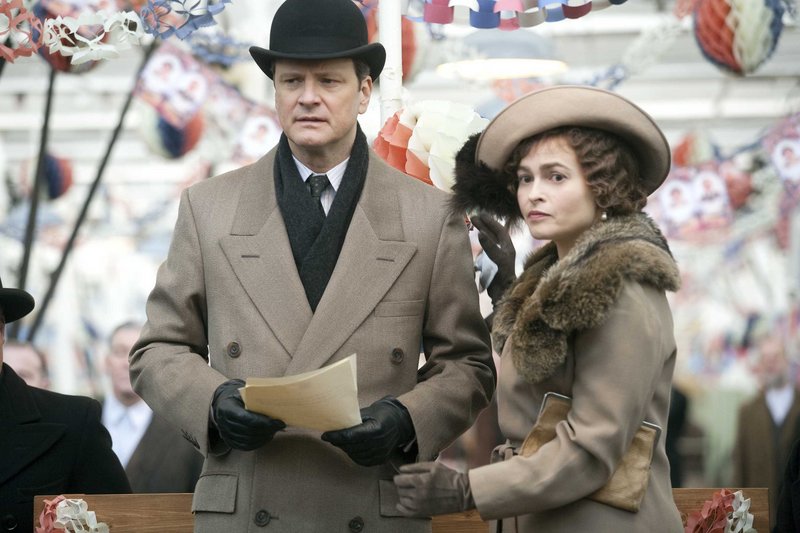According to “The King’s Speech,” King George VI — born Albert Frederick Arthur George, “Bertie” to his intimates — had such a paralyzing stutter that it was a struggle for him to say his own name. Telling bedtime stories to his daughters, the future Queen Elizabeth II and Princess Margaret, was a trial, not a pleasure.
The opposite is true of Tom Hooper’s rousing comedy of manners, a tale of the king and the court jester who helped untie the monarch’s tongue and enabled him to find his voice. Under Hooper’s deft direction, it packs the suspense of a thriller: Will the monarch falter before the crosshairs of the microphone or rise to eloquence, rallying his people to unite against Fascism?
As the speechmaker and his speech teacher, Colin Firth and Geoffrey Rush elevate each other’s game to the stratosphere and beyond.
The witty script by David Seidler is a reverse “Pygmalion,” with Lionel Logue (Rush), an Aussie, tutoring the royal (Firth) in the common touch that helps him connect with his subjects.
Director Hooper (“John Adams,” “The Damned United”) tickles this material into “Odd Couple” comedy, deftly contrasting the fastidious monarch with the eccentric speech therapist who employs the methods of a psychologist.
Having exhausted every legitimate speech specialist in London, Bertie’s wife, Elizabeth (Helena Bonham Carter, all propriety with a merry smile), auditions Logue. The bare floors and peeling-plaster walls of his modest offices where much of the action takes place couldn’t be further from the plush carpets and silk hangings of the royal bell jar.
Firth, the very embodiment of the inhibited Brit, plays Bertie as an overgrown boy, still smarting from the humiliations of his father (Michael Gambon as George V) and the cruel taunts of his older brother (Guy Pearce as David, later Edward VIII). George V speaks in tones as warm and sweet as plum pudding; Bertie speaks as if with a mouth full of plum pits. Bertie eyes the microphone with all the enthusiasm of French royals regarding the guillotine.
This man eclipsed by the long shadow of his father and firstborn brother is relieved, he tells Logue, that as the second born, he will not be king. But when his brother abdicates the throne to wed twice-divorced adventuress Wallis Simpson, fate puts Bertie in the hot seat of the throne.
Initially, Hooper shows Bertie as a very small figure in a very large frame, diminished by the space around him. Hooper also uses wide-angle “fisheye” lenses to underline Bertie’s distorted self-image. As he gains confidence, he becomes physically larger, commanding the frame as he will command his nation.
Scored by Alexandre Desplat, whose music is simultaneously jaunty and genteel, “The King’s Speech” makes lovely use of Mozart and Beethoven to underscore two decisive sequences. The supporting performances are perfection. Bonham Carter brings patience and piquancy to the part of the supportive wife, Pearce is continuous motion as the pleasure-loving Edward VIII, and Derek Jacobi is the picture of pomp as the Archbishop of Canterbury. (And, yes, that’s Claire Bloom as the unfailingly correct Queen Mother.)
On one level “The King’s Speech” is the obligatory Oscar-season “the royals are just like us” movie, kin, in more ways than one, to “The Queen.” Also like “The Queen,” it shows how a clever Everyman helps to save the monarchy.
But its essential appeal is as the story of the sympathetic teacher who makes all the difference to the man who fights his disability with the same resolve he brings to fighting Hitler.
P.S.: Because Bertie drops the F-bomb as a means of loosening his tongue, the film is rated R. Notwithstanding this brief fusillade of profanity, the film is ideal family entertainment for those 12 and older.
Send questions/comments to the editors.



Success. Please wait for the page to reload. If the page does not reload within 5 seconds, please refresh the page.
Enter your email and password to access comments.
Hi, to comment on stories you must . This profile is in addition to your subscription and website login.
Already have a commenting profile? .
Invalid username/password.
Please check your email to confirm and complete your registration.
Only subscribers are eligible to post comments. Please subscribe or login first for digital access. Here’s why.
Use the form below to reset your password. When you've submitted your account email, we will send an email with a reset code.